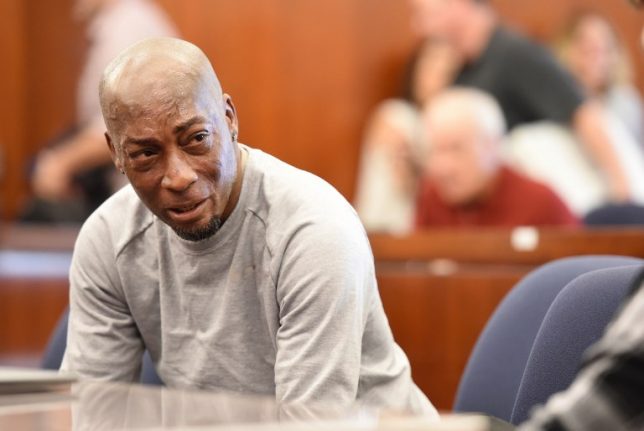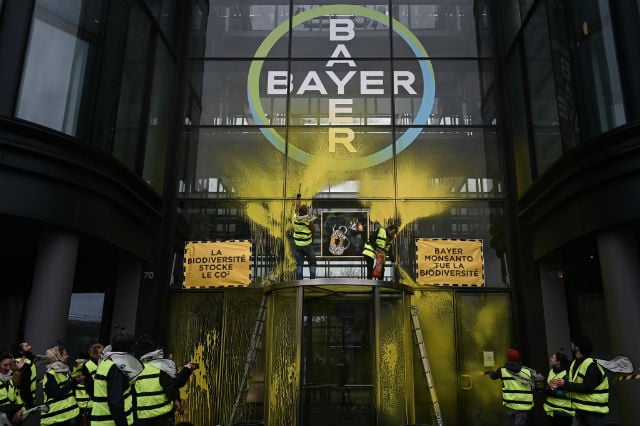As observers predicted thousands more future claims against the company in the wake of Monsanto's defeat, Bayer — which recently acquired the US giant — said the California ruling went against scientific evidence.
“On the basis of scientific conclusions, the views of worldwide regulatory authorities and the decades-long practical experience with glyphosate use Bayer is convinced that glyphosate is safe and does not cause cancer,” the company said in a statement.

It said other future court proceedings with other juries could “arrive at different conclusions” than the California jury which on Friday ordered chemical giant Monsanto to pay out in the lawsuit, the first to accuse glyphosate of causing cancer.
Jurors unanimously found that Monsanto — which vowed to appeal — acted with “malice” and that its weed killers Roundup and the professional grade version RangerPro contributed “substantially” to Dewayne Johnson's terminal illness.

Following eight weeks of trial proceedings, the San Francisco jury ordered Monsanto to pay $250 million in punitive damages along with compensatory damages and other costs, bringing the total figure to nearly $290 million.
Johnson, diagnosed in 2014 with non-Hodgkin's lymphoma — a cancer that affects white blood cells — says he repeatedly used a professional form of Roundup while working at a school in Benicia, California.
“I want to thank everybody on the jury from the bottom of my heart,” Johnson, 46, said after the verdict.
“I am glad to be here; the cause is way bigger than me. Hopefully this thing will get the attention it needs.”
Johnson, who appeared to fight back sobs while the verdict was read, wept openly, as did some jurors, when he met with the panel afterwards.
The lawsuit built on 2015 findings by the International Agency for Research on Cancer, part of the UN World Health Organization, which classified Roundup's main ingredient glyphosate as a probable carcinogen, causing the state of California to follow suit.

Monsanto vice president Scott Partridge was unimpressed with the results. “The jury got it wrong,” he told reporters outside the courthouse.
“We are sympathetic to Mr Johnson and his family,” Monsanto said in a statement, but promised to appeal the ruling and “continue to vigorously defend this product, which has a 40-year history of safe use and continues to be a vital, effective and safe tool for farmers and others.”
Johnson's attorney Brent Wisner said the verdict “shows the evidence is overwhelming” that the product poses danger.
“When you are right, it is really easy to win,” he said.
– More to come? –
Wisner called the ruling the “tip of the spear” of litigation likely to come.
“The jury sent a message to the Monsanto boardroom that they have to change the way they do business,” said Robert F. Kennedy Jr — an environmental lawyer, son of the late US senator and a member of Johnson's legal team.
Partridge said that Monsanto had no intention of settling the slew of similar cases in the legal queue, saying if anything the company would work harder to demonstrate the weed killer is safe.
“It is the most widely used and most widely studied herbicide in the world,” Partridge said.
Johnson's team expressed confidence in the verdict, saying the judge in the case kept out a mountain of more evidence backing their position.
“All the efforts by Monsanto to put their finger in the dike and hold back the science; the science is now too persuasive,” Kennedy said, pointing to “cascading” scientific evidence about the health dangers of Roundup.
“You not only see many people injured, you see the corruption of public officials, the capture of agencies that are supposed to protect us from pollution and the falsification of science,” Kennedy said.
'Win for all of humanity'
Roundup is Monsanto's leading product.
“The Johnson vs Monsanto verdict is a win for all of humanity and all life on earth,” said Zen Honeycutt, founding executive director of non-profit group Moms Across America.
Records unsealed earlier by a federal court lent credence to Johnson's claims — internal company emails with regulators suggested Monsanto had ghostwritten research later attributed to academics.
Founded in 1901 in St Louis, Missouri, Monsanto began producing agrochemicals in the 1940s. It was acquired by Bayer for more than $62 billion in June.
Monsanto launched Roundup in 1976 and soon thereafter began genetically modifying plants, making some resistant to Roundup.



 Please whitelist us to continue reading.
Please whitelist us to continue reading.
Quack science and a shyster lawyer convince a quack jury